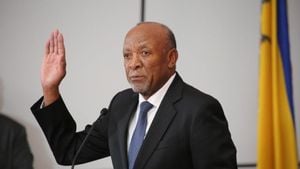COVID-19 vaccine hesitancy has become more pronounced, with communities across the U.S. grappling with its consequences. Vaccine resistance, particularly among certain populations, raises concerns for public health, especially as public health officials work to rehabilitate trust with the communities affected. From Oregon to Alabama, case reports reveal disturbingly low vaccination rates for diseases once easily prevented by vaccines. While COVID-19 vaccines are broadly accessible, those skeptical about them are increasingly refusing not just COVID-19 vaccination, but also traditional vaccines like the DTaP vaccine, which protects against whooping cough and other diseases.
Healthcare providers are especially troubled by this growing trend. With Thanksgiving fast approaching, many are recalling the impact of the pandemic on family gatherings, underscoring the dangers still posed by COVID-19. The disease has not vanished; rather, it remains endemic, continuing to circulate and evolve. Public health officials like Alan Melnick, Clark County's Public Health Director, express frustration over the inevitable illnesses stemming from vaccine hesitancy. “There’s no reason why we should be seeing these outbreaks from something so preventable,” he lamented.
A recent rise in whooping cough cases highlights the toll of diminished vaccine participation. Reports from Washington and Oregon show alarming increases: Washington reported 1,193 cases of whooping cough as of November 2, compared to 51 the previous year. Oregon, too, saw cases rocket to 850, up from just 33 a year before. These infections affect adults and children alike, often among those who remain unvaccinated, resulting from growing vaccine exemptions and hesitancy stemming from decades-old discredited beliefs.
The narratives surrounding vaccine hesitancy differ by region and can be influenced by historical perspectives on liberty and personal freedom. Dr. Ben Hoffman, president of the American Academy of Pediatrics, shared insights about the unique health dialogues occurring within communities like Oregon, influenced by its frontier spirit and distinct belief systems. The discredited study linking vaccines to autism still reverberates today, fueling families’ misgivings, which leads to increasingly lower vaccination rates.
Despite advancements and clear scientific support for vaccines, establishing trust is key to overcoming hesitancy, as emphasized by Dr. Hoffman. Many families often feel isolated from the health care system due to shorter consultations, making it challenging to cultivate long-term relationships where trust can flourish. The dynamic between healthcare providers and their patients must evolve to encourage families to engage meaningfully with vaccinations.
Across the country, the response isn't uniform. Interestingly, vaccination rates can vary significantly from one area to another. Some minors have voiced their intentions to reject vaccines outright, preferring to rely on their immune systems, even as health experts stress the importance of preventive measures.
To counteract the rising trend of vaccine resistance, health authorities are taking proactive measures, driving initiatives to deliver information directly to the public. Mobile vaccination vans, like those deployed by NHS Birmingham and Solihull, aim to reach vulnerable communities, ensuring access to vaccinations against COVID-19, flu, and RSV. They target over-65s and individuals with compromised immune systems, emphasizing education about how vaccines protect the most vulnerable among us.
Jenna Shaw, clinical site lead for the mobile units, noted the importance of making vaccinations accessible. "We try to reach hard-to-access areas to offer sentiment and direct information," she stated, highlighting how personal connections can dismantle barriers, albeit slowly.
The growing vaccine hesitancy also reflects underlying societal beliefs about health, medicine, and government intervention. Campaigns centered on education rather than pressure appear to be more effective. The narrative must shift from coercion to community empowerment, treating young people’s concerns with respect and care as public health efforts seek to reverse hesitancy and restore confident acceptance of vaccines.
Public health agencies are now recognizing the need to address misconceptions head-on, bolstered by powerful storytelling to combat the entrenched fears held by vaccine-hesitant individuals. Building relationships over time can illuminate the real benefits of vaccinations and transform the fear currently dominating discussions around public health.
The rise of online misinformation and instant communication exacerbates the issue, creating echo chambers where fear can fester unchecked. Yet, local public health directors are devising innovative strategies to reclaim conversations through trusted community members, such as leaders and educators, finding ways to create dialogue and mitigate misunderstandings.
Hearteningly, as conversations about vaccines evolve, so too does the opportunity to rebuild trust and potentially reverse declining rates. Counties like Clark and, more broadly, states like Oregon must lean heavily on collaboration from non-profit organizations, local governments, and medical associations, fostering messages of unity and health instead of division.
Direct outreach programs have shown promise, highlighting the importance of making professional discourse more accessible. Availability of vaccines can lead to improved perceptions and acceptance, but success hinges on listening to communities’ fears and addressing them accordingly.
While the pandemic raised new challenges for vaccine promotion, it also opened pathways for health advocates to connect with more individuals, providing opportunities for meaningful dialogue about immunization. The next challenge lies within addressing the longstanding myths around vaccines, assessing each community’s comfort levels and promoting positive testimonials from vaccinated individuals.
The health community continues to grapple with the existential crisis created by vaccine hesitancy. Heightened focus on personal freedoms must be reconciled with public health priorities, driving vaccination campaigns to communicate effectively about the health benefits vaccines bring to communities. Continued evolution of outreach efforts can pave the way toward reducing hesitance, particularly as vaccine development continues to progress and new immunization options become available.
With holidays upon us, the stakes remain as high as ever to reverse the tide of vaccine hesitancy and protect public health. Sustained collaboration and the establishment of community leaders as advocates for vaccination may be the key ingredients needed to combat misinformation deeply rooted within society. Recovery from the pandemic has shown to be both slow and delicate, but it also heralds the power of education when placed at the forefront. Building safe spaces for discussions surrounding health and safety gives local entities the tools they need to craft persuasive narratives and address fears head-on, igniting meaningful changes as communities move forward together.



